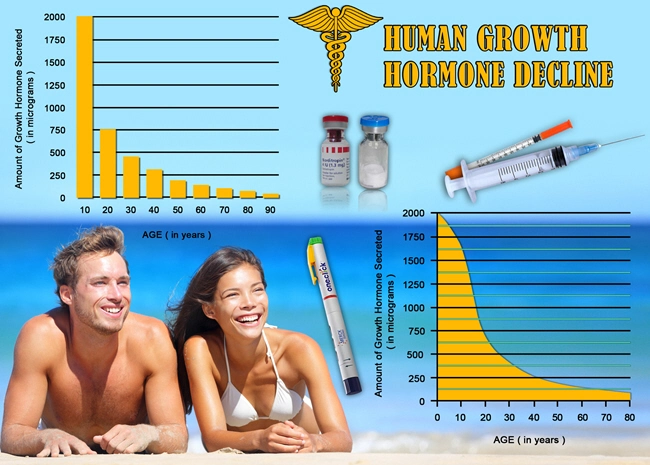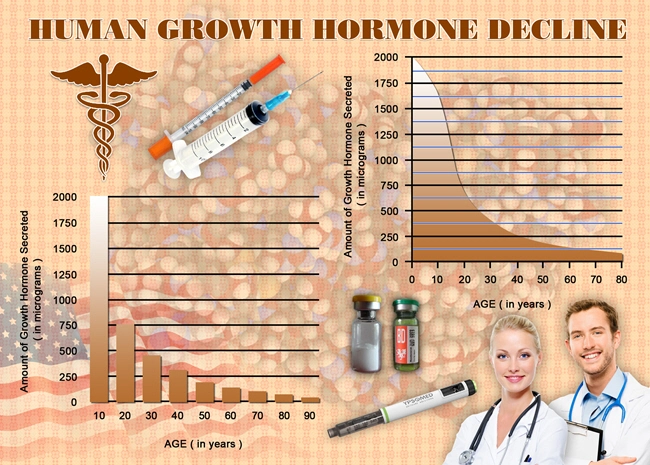
Introduction to Schizophrenia and Its Prevalence Among American Males
Schizophrenia, a complex and debilitating psychiatric disorder, affects approximately 1.5 million Americans, with a notable prevalence among males. Characterized by hallucinations, delusions, and cognitive impairments, schizophrenia significantly impacts the quality of life and functionality of those affected. Traditional treatment approaches have primarily focused on antipsychotic medications, yet a growing body of research suggests that endocrinological factors may play a critical role in the management and potential amelioration of this condition.
The Endocrine System and Its Influence on Mental Health
The endocrine system, responsible for regulating hormones throughout the body, has been increasingly recognized for its influence on mental health. Hormones such as cortisol, testosterone, and thyroid hormones can affect mood, cognition, and overall brain function. In the context of schizophrenia, dysregulation of these hormones has been observed, suggesting a potential link between endocrine health and the severity of psychiatric symptoms.
Exploring the Role of Testosterone in Male Schizophrenia
Testosterone, a key male hormone, has been the subject of several studies examining its impact on schizophrenia. Research indicates that men with schizophrenia often exhibit lower levels of testosterone compared to their healthy counterparts. This hormonal imbalance may contribute to the negative symptoms of schizophrenia, such as social withdrawal and lack of motivation. Consequently, some researchers propose that testosterone supplementation could be a beneficial adjunct therapy for male patients, potentially improving symptom management and overall well-being.
The Impact of Cortisol and Stress on Schizophrenia
Cortisol, commonly known as the stress hormone, is another critical player in the endocrine system's influence on schizophrenia. Elevated cortisol levels, often resulting from chronic stress, have been linked to increased psychotic symptoms and cognitive decline in individuals with schizophrenia. Managing stress and regulating cortisol levels through lifestyle interventions, such as mindfulness and exercise, may offer additional therapeutic benefits for affected males.
Thyroid Function and Its Relevance to Schizophrenia
Thyroid hormones, which regulate metabolism and energy levels, also appear to be implicated in schizophrenia. Hypothyroidism, or low thyroid function, has been associated with an increased risk of developing schizophrenia and may exacerbate symptoms in those already diagnosed. Regular monitoring of thyroid function and appropriate treatment of thyroid disorders could therefore be an essential component of a comprehensive treatment plan for male patients with schizophrenia.
Integrating Endocrinology into Schizophrenia Treatment Protocols
Given the potential impact of endocrine factors on schizophrenia, integrating endocrinological assessments and interventions into standard treatment protocols could enhance outcomes for American males. This approach would involve routine screening for hormonal imbalances, personalized hormone therapy where appropriate, and collaboration between psychiatrists and endocrinologists to tailor treatment plans that address both psychiatric and hormonal needs.
Challenges and Future Directions in Endocrine-Based Schizophrenia Treatment
Despite the promising potential of endocrine-based treatments, several challenges remain. The variability in individual hormonal profiles necessitates a personalized approach, which can be resource-intensive. Additionally, the long-term effects of hormone supplementation in schizophrenia require further investigation to ensure safety and efficacy. Future research should focus on large-scale clinical trials to validate the benefits of endocrine interventions and explore novel therapeutic targets within the endocrine system.
Conclusion: A Holistic Approach to Male Schizophrenia Treatment
In conclusion, the role of endocrinology in treating male schizophrenia in the USA represents a frontier in psychiatric care. By recognizing and addressing the interplay between hormonal health and psychiatric symptoms, healthcare providers can offer more holistic and effective treatment options. As research continues to unravel the complexities of this relationship, the integration of endocrinology into schizophrenia management holds the promise of improved outcomes and enhanced quality of life for affected American males.
Contact Us Today For A Free Consultation
Dear Patient,
Once you have completing the above contact form, for security purposes and confirmation, please confirm your information by calling us.
Please call now: 1-800-380-5339.
Welcoming You To Our Clinic, Professor Tom Henderson.

- Hormonal Imbalances and Sleep Disorders: Impact and Interventions for American Men [Last Updated On: March 16th, 2025] [Originally Added On: March 16th, 2025]
- Hormonal Changes in American Men Over 50: Impacts and Management Strategies [Last Updated On: March 17th, 2025] [Originally Added On: March 17th, 2025]
- Endocrinology's Role in Weight Management for American Males: Hormones and Strategies [Last Updated On: March 17th, 2025] [Originally Added On: March 17th, 2025]
- Vitamin D's Crucial Role in Endocrine Health for American Males [Last Updated On: March 18th, 2025] [Originally Added On: March 18th, 2025]
- Autoimmune Endocrine Disorders: Symptoms, Diagnosis, and Treatment for American Males [Last Updated On: March 19th, 2025] [Originally Added On: March 19th, 2025]
- Diet's Impact on Endocrine Health in American Men: Testosterone, Thyroid, Insulin, Adrenals [Last Updated On: March 19th, 2025] [Originally Added On: March 19th, 2025]
- Managing PCOS in Transgender American Men: Endocrinological and Holistic Approaches [Last Updated On: March 19th, 2025] [Originally Added On: March 19th, 2025]
- Lifestyle Choices and Their Impact on Endocrine Health in American Men [Last Updated On: March 19th, 2025] [Originally Added On: March 19th, 2025]
- Endocrinology's Role in Managing Chronic Fatigue in American Males: Hormonal Insights [Last Updated On: March 20th, 2025] [Originally Added On: March 20th, 2025]
- Endocrinology's Role in Men's Sexual Health: Understanding and Treating Dysfunction [Last Updated On: March 21st, 2025] [Originally Added On: March 21st, 2025]
- Endocrine Health and Cancer Risk in American Men: A Comprehensive Overview [Last Updated On: March 22nd, 2025] [Originally Added On: March 22nd, 2025]
- Endocrinology's Role in Enhancing Athletic Performance for American Male Athletes [Last Updated On: March 22nd, 2025] [Originally Added On: March 22nd, 2025]
- Endocrine Health's Impact on Mental Well-being in American Males [Last Updated On: March 22nd, 2025] [Originally Added On: March 22nd, 2025]
- Alcohol's Impact on Male Endocrine System: Hormones, Health, and Mitigation Strategies [Last Updated On: March 23rd, 2025] [Originally Added On: March 23rd, 2025]
- Smoking's Impact on Endocrine Health in American Men: Hormonal Disruption and Risks [Last Updated On: March 23rd, 2025] [Originally Added On: March 23rd, 2025]
- Endocrinology's Role in Muscle Health for American Males: Hormones and Optimization Strategies [Last Updated On: March 23rd, 2025] [Originally Added On: March 23rd, 2025]
- Endocrine Health and Prostate Cancer: A Vital Connection for American Men [Last Updated On: March 23rd, 2025] [Originally Added On: March 23rd, 2025]
- Endocrine Disruptors: Impact on American Male Health and Mitigation Strategies [Last Updated On: March 23rd, 2025] [Originally Added On: March 23rd, 2025]
- Managing Endocrine Disorders in American Men with Autoimmune Diseases: A Comprehensive Guide [Last Updated On: March 24th, 2025] [Originally Added On: March 24th, 2025]
- Hormonal Imbalances and Male Infertility: Insights and Solutions for American Men [Last Updated On: March 24th, 2025] [Originally Added On: March 24th, 2025]
- Hormonal Impacts on Dental Health in American Men: Testosterone, Diabetes, Thyroid, and Cancer Risks [Last Updated On: March 24th, 2025] [Originally Added On: March 24th, 2025]
- Exercise Benefits for American Males: Enhancing Endocrine Function and Hormonal Balance [Last Updated On: March 24th, 2025] [Originally Added On: March 24th, 2025]
- Endocrine Health and Hearing: Implications for American Males [Last Updated On: March 24th, 2025] [Originally Added On: March 24th, 2025]
- Nutrition's Impact on Endocrine Health for American Males: A Comprehensive Guide [Last Updated On: March 24th, 2025] [Originally Added On: March 24th, 2025]
- Hormonal Influences on Joint Health in American Men: Insights and Management Strategies [Last Updated On: March 24th, 2025] [Originally Added On: March 24th, 2025]
- Managing Endocrine Disorders in American Men with Neurological Conditions: A Comprehensive Approach [Last Updated On: March 25th, 2025] [Originally Added On: March 25th, 2025]
- Hormonal Influences on Skin Health in American Men: A Comprehensive Guide [Last Updated On: March 25th, 2025] [Originally Added On: March 25th, 2025]
- Endocrinology's Role in Managing Gout Among American Males: Hormonal Insights [Last Updated On: March 25th, 2025] [Originally Added On: March 25th, 2025]
- Managing Type 2 Diabetes in American Men: A Comprehensive Approach [Last Updated On: March 25th, 2025] [Originally Added On: March 25th, 2025]
- Stress Impact on Male Endocrine Health: Hormones and Holistic Management Strategies [Last Updated On: March 25th, 2025] [Originally Added On: March 25th, 2025]
- Liver Function's Crucial Role in Endocrine Health for American Males [Last Updated On: March 25th, 2025] [Originally Added On: March 25th, 2025]
- Hormonal Balance and Kidney Health: Critical Insights for American Men [Last Updated On: March 25th, 2025] [Originally Added On: March 25th, 2025]
- Exploring Endocrinology's Role in Managing Male Depression in the USA [Last Updated On: March 25th, 2025] [Originally Added On: March 25th, 2025]
- Endocrine-Gastrointestinal Interplay in American Men: Management and Impact [Last Updated On: March 25th, 2025] [Originally Added On: March 25th, 2025]
- Endocrinology's Impact on Immune Health in American Men: Hormones and Lifestyle [Last Updated On: March 26th, 2025] [Originally Added On: March 26th, 2025]
- Managing Endocrine Disorders and Heart Disease in American Men: Strategies and Insights [Last Updated On: March 26th, 2025] [Originally Added On: March 26th, 2025]
- Endocrine Health and Vision: Key Considerations for American Males [Last Updated On: March 27th, 2025] [Originally Added On: March 27th, 2025]
- Male Eating Disorders: The Crucial Role of Endocrinology in Diagnosis and Treatment [Last Updated On: March 27th, 2025] [Originally Added On: March 27th, 2025]
- Endocrinology's Role in Treating PTSD Among American Males: A Comprehensive Approach [Last Updated On: March 27th, 2025] [Originally Added On: March 27th, 2025]
- Hormonal Imbalances and Foot Health: A Guide for American Men [Last Updated On: March 27th, 2025] [Originally Added On: March 27th, 2025]
- Exploring Endocrinology's Role in Treating ADHD in American Males [Last Updated On: March 28th, 2025] [Originally Added On: March 28th, 2025]
- Hormonal Imbalances and Insomnia in American Men: Endocrinological Insights and Treatments [Last Updated On: March 28th, 2025] [Originally Added On: March 28th, 2025]
- Exploring Endocrine Treatments for Male Anxiety in the USA [Last Updated On: March 28th, 2025] [Originally Added On: March 28th, 2025]
- Endocrine-Digestive Health Link: Hormones, Disorders, and Holistic Care for American Males [Last Updated On: March 28th, 2025] [Originally Added On: March 28th, 2025]
- Endocrine Disorders in American Men: Dermatological Impacts and Management Strategies [Last Updated On: March 28th, 2025] [Originally Added On: March 28th, 2025]
- Sleep's Crucial Role in Endocrine Health for American Males [Last Updated On: March 28th, 2025] [Originally Added On: March 28th, 2025]
- Endocrine Health Impacts Respiratory Function in American Males: Research and Management Strategies [Last Updated On: March 28th, 2025] [Originally Added On: March 28th, 2025]
- Endocrinology and Hair Health: Hormonal Impacts and Management for American Men [Last Updated On: March 28th, 2025] [Originally Added On: March 28th, 2025]
- Caffeine's Multifaceted Impact on Endocrine Health in American Males [Last Updated On: March 29th, 2025] [Originally Added On: March 29th, 2025]
- Endocrine Health and Nail Changes in American Males: Detection and Management [Last Updated On: March 29th, 2025] [Originally Added On: March 29th, 2025]
- Endocrine Disorders in Men: Managing Impact on Eye Health [Last Updated On: March 29th, 2025] [Originally Added On: March 29th, 2025]
- Hormonal Imbalances and Bipolar Disorder: A New Frontier in Men's Mental Health [Last Updated On: March 29th, 2025] [Originally Added On: March 29th, 2025]
- Endocrine Disorders and Hand Health in American Males: Impacts and Management [Last Updated On: March 30th, 2025] [Originally Added On: March 30th, 2025]
- Hydration's Impact on Endocrine Health: Essential Insights for American Males [Last Updated On: April 2nd, 2025] [Originally Added On: April 2nd, 2025]
- Endocrine Disorders and Ear Health: Insights and Management for American Men [Last Updated On: April 2nd, 2025] [Originally Added On: April 2nd, 2025]
- Hormonal Fluctuations and Nasal Health: Impacts and Management for American Men [Last Updated On: April 3rd, 2025] [Originally Added On: April 3rd, 2025]
- Endocrinology's Impact on Heart Health in American Men: Hormones and Cardiovascular Wellness [Last Updated On: April 6th, 2025] [Originally Added On: April 6th, 2025]
- Endocrine-Throat Health Link in American Males: Impacts and Management Strategies [Last Updated On: April 6th, 2025] [Originally Added On: April 6th, 2025]
- Supplements and Endocrine Function: Impacts and Risks for American Males [Last Updated On: April 9th, 2025] [Originally Added On: April 9th, 2025]
- Managing Endocrine Disorders in Men with Lung Conditions: A Holistic Approach [Last Updated On: April 10th, 2025] [Originally Added On: April 10th, 2025]









